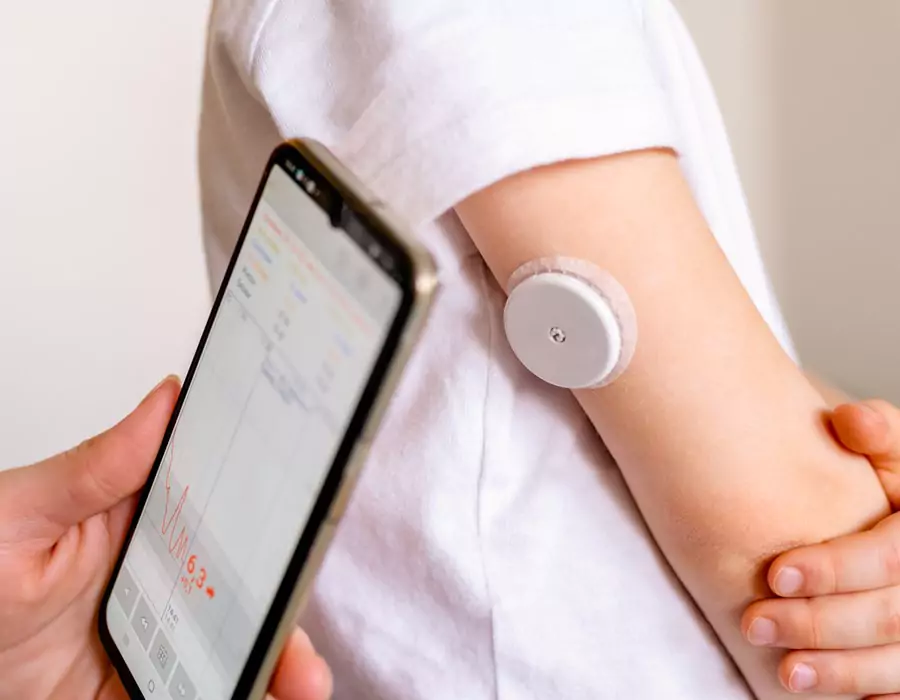
UP TO 40% OFF SITEWIDE






Are Dexcom Sensors Covered By Medicare?


The emergence of technological solutions like Dexcom sensors has remarkably transformed the landscape of diabetes management. Diabetes patients, striving for stability in their blood glucose levels, find solace in these devices. Here's the silver lining - Medicare does cover Dexcom sensors, thus making it accessible to a broader segment of the population.
If you've been diagnosed with diabetes and have a prescription for a Continuous Glucose Monitoring (CGM) system from a registered healthcare provider, you are eligible. But that's not where the eligibility ends.
The scope of this coverage extends to a wider spectrum of individuals who depend on any form of insulin. Moreover, even those who undergo low blood glucose events without being on insulin are included, expanding the horizon of those who can benefit from this coverage6.
The Dexcom G7 and Medicare
Imagine having the world's smallest yet the most accurate CGM system within your grasp - that's what the Dexcom G7 offers. This new-age device is also enveloped within the Medicare coverage, making it even more accessible to Medicare beneficiaries. What does this signify? It means the most cutting-edge technology in diabetes management is within your reach.
It is not just another device; it is a medical marvel that signifies progress and promises improved health outcomes. The recent changes brought about in Medicare regulations have led to a sweeping expansion of coverage, implying millions more now stand to benefit from Dexcom's CGM systems.
With the Dexcom G7, you can expect a more affordable, yet highly advanced CGM system compared to others available in the market. This translates to better health management without burning a hole in your pocket. For Medicare patients, it symbolizes the democratization of healthcare technology7.
How to Check Your Eligibility
If you're a Medicare beneficiary eyeing to avail the benefits of Dexcom's CGM system, you'll be glad to know the process is devoid of any complexity. It's a straight path forward, designed to make it easy for beneficiaries like you. Dexcom provides a complementary benefits check that will help you ascertain whether you qualify for coverage.
What if you discover you don't have CGM coverage? Worry not, Dexcom has a contingency plan. Dexcom's pharmacy savings program8 serves as a safety net, ensuring that even if you don't have CGM coverage, you can still avail some of the benefits.
Thus, with or without CGM coverage, you stand to gain from Dexcom's offerings. Medicare’s inclusion of Dexcom sensors and the newer Dexcom G7 into its coverage, marks a leap in democratizing access to life-changing diabetes management tools.
This coverage isn't just about numbers; it's about a lifeline extended to millions. As technology continues to evolve and policies become more inclusive, individuals living with diabetes can look forward to a future with better control over their health and greater peace of mind. Remember, understanding your eligibility is crucial, and Dexcom simplifies that for you with its free benefits check and pharmacy savings program.
Implications of Medicare Coverage for Dexcom Sensors
The Impact on Patients
The escalating prevalence of diabetes around the world is unmistakable, demonstrating an emergent need for innovative and potent management techniques. This necessity is gradually becoming more pronounced as the population of diabetes patients continues to swell. Among these emerging solutions, Dexcom sensors, which facilitate continuous glucose monitoring, stand as a considerable innovation.
These sensors represent far more than just another technological breakthrough. They offer an empowering tool for patients, granting them the opportunity to play a more active role in managing their health.
By delivering real-time feedback on blood glucose levels, Dexcom sensors enable patients to make informed choices about their daily habits. Decisions surrounding diet, physical activity, and medication administration are no longer made in the dark, but with precise, instant data.
This capability revolutionizes the approach to diabetes management. It offers the potential to significantly enhance the life quality of those grappling with the realities of living with diabetes. Equally noteworthy is the fact that Medicare coverage of Dexcom sensors makes this transformative tool more accessible. It ensures that a wider demographic, particularly those who could benefit most, has access to this innovative technology.
The Role of Dexcom Clarity
In addition to the progressive glucose sensors, Dexcom's repertoire of advanced health management tools includes a unique feature: Dexcom Clarity. This powerful tool operates as a comprehensive resource for both patients and healthcare providers, facilitating a holistic, data-driven approach to diabetes care. Dexcom Clarity provides a comprehensive platform for tracking glucose trends and patterns over time.
It equips users with comparative charts and statistical analysis tools, providing a more nuanced understanding of each individual's unique health situation. This empowers patients and providers alike to make more informed decisions and better anticipate potential health challenges. Furthermore, this robust feature has been designed with convenience in mind. The data gathered by Dexcom Clarity can be securely stored, easily retrieved, and even printed out for reference during healthcare visits.
This not only elevates the quality of care delivered but also fortifies the patient-provider relationship, fostering a sense of mutual understanding and trust. One of the most notable facets of Dexcom Clarity is its integration with healthcare billing systems. The service can be billed under a specific Current Procedural Terminology (CPT) code, meaning that it can be covered by Medicare.
This is a significant benefit, ensuring that Dexcom Clarity remains accessible to patients, regardless of their economic circumstances. This accessibility reinforces Dexcom's commitment to driving progress in diabetes care, not just through technological innovation, but also through a focus on accessibility and patient empowerment. Dexcom sensor system and Dexcom Clarity feature represent a leap forward in diabetes management.
They not only offer advanced tools for monitoring and managing blood glucose levels but also empower patients to take control of their health. Medicare coverage of these tools further ensures that they are within reach for those who need them most. In the fight against diabetes, these advancements provide a beacon of hope, illuminating a pathway towards improved quality of life and better health outcomes for patients.
The Bigger Picture: Medicare's Impact on Healthcare
A titan among global health insurance programs, Medicare commands a significant presence in the healthcare arena of the United States. This behemoth of a program provides almost universal health insurance coverage for seniors and a considerable number of individuals grappling with disabilities.
Accounting for roughly one-sixth - about 17 percent - of health-related expenditures in the U.S., its footprint is truly impressive. Looking back, the introduction of Medicare in 1965 served as a groundbreaking event, marking the single most significant shift in health insurance coverage in American history.
This historic milestone, aside from extending coverage, steered a consequential uptick in the expenses associated with hospital services. Indeed, the reverberations of this momentous policy change continue to be felt in the American healthcare system.
The Benefits of Medicare
When first considering the tangible impact of Medicare, one might look for its imprint on the mortality rate of seniors. However, when the program was initially unveiled, the effects on this metric were not readily apparent. That being said, the advantages of Medicare are multifaceted and stretch beyond the simplistic measure of mortality rates.
One significant effect of the program has been a notable decrease in the risk of seniors facing hefty out-of-pocket medical expenses. By easing the financial burden associated with healthcare costs, Medicare has offered a lifeline to countless elderly individuals. This decrease in financial risk stands out as a paramount benefit of the program. However, it doesn't stop there.
Beyond the purely financial, Medicare has potentially facilitated improvements in health status for the elderly, even without concurrent improvements in mortality. This suggests that the program's efficacy extends beyond simple measures and that its benefits may be more nuanced and multifactorial. Delving further into the ripple effects of Medicare, research points towards the program possibly having expedited the adoption of innovative cardiac technologies.
This would suggest that the long-term implications of Medicare on senior mortality may be considerably larger than what preliminary examinations may have projected. Illustrative of its commitment to mitigating financial risk and enhancing health outcomes for its beneficiaries, Medicare's decision to cover Dexcom sensors is a testament to its ongoing mission. This inclusion speaks volumes about the program's dedication to the welfare of elderly and disabled individuals.
The role of Medicare in the U.S. healthcare system cannot be understated. It stands tall as a pillar, offering support, stability, and assurance to millions of Americans. In the face of healthcare costs that often seem to spiral upwards uncontrollably, Medicare serves as a buffer, ensuring that vulnerable populations are not left unprotected. As we continue to navigate the complexities of healthcare in the U.S., the importance of Medicare remains as relevant as ever.
Through its vast coverage and commitment to the well-being of the elderly and disabled, Medicare proves itself to be an indispensable ally. Its presence continues to have a transformative impact on healthcare, ensuring a safety net for those who need it most. Medicare, with its enduring legacy and continuous evolution, remains a cornerstone of American healthcare.
Wrapping Up
In conclusion, the importance of effective and accessible diabetes management tools like Dexcom sensors cannot be overstated. With the rise in diabetes prevalence, tools that allow for better self-management and improved health outcomes are invaluable. The fact that Medicare covers these devices is a testament to their importance and the commitment to improving the health of those living with diabetes.
Through its coverage of Dexcom sensors, Medicare is not only reducing the financial burden on patients but also paving the way for a healthier future. So, are Dexcom sensors covered by Medicare? Yes, they are. And this coverage marks a significant step in the right direction, one that promises better health outcomes for millions of people.
It's a win for patients, a win for healthcare providers, and a win for the fight against diabetes. With that, we come to the end of this in-depth exploration of Dexcom sensors and their coverage under Medicare. As always, if you're considering Dexcom sensors or any other treatment or management strategy for diabetes, be sure to consult with your healthcare provider to determine the best path forward for you.
About The Author
Meet Dr. Ahmet Ergin a highly skilled and dedicated endocrinologist with a passion for diabetes care. Dr. Ergin earned his medical degree with honors from Marmara University in Istanbul. He completed internal medicine residency and endocrinology fellowship at Cleveland Clinic.
Dr. Ergin is board-certified in Internal Medicine, Endocrinology, Diabetes, and Metabolism due to his vast medical expertise. He's a certified diabetes educator, author of "The Ultimate Diabetes Book," and founder of "the SugarMD YouTube channel."
Dr. Ergin offers exceptional diabetes care to his patients in Port Saint Lucie, FL, helping them manage effectively. Disclaimer: These statements have not been evaluated by the Food and Drug Administration. Information on this website isn’t intended to treat, cure or prevent any disease. Discuss with your doctor and do not self-treat.
Written By Dr. Ahmet Ergin
466 total articles
Meet Dr. Ahmet Ergin, a highly skilled and dedicated endocrinologist with a passion for diabetes care. Dr. Ergin earned his medical degree with honors from Marmara University in Istanbul. He completed internal medicine residency and endocrinology fellowship at Cleveland Clinic. Dr. Ergin is board-certified in Internal Medicine, Endocrinology, Diabetes, and Metabolism due to his vast medical expertise. He's a certified diabetes educator, author of “The Ultimate Diabetes Book,” and founder of “the SugarMD YouTube channel.” Dr. Ergin offers exceptional diabetes care to his patients in Port Saint Lucie, FL, helping them manage effectively. For a closer look into his insights and experiences, connect with Dr. Ahmet Ergin on LinkedIn, Instagram, and YouTube.”
Disclaimer: These statements have not been evaluated by the Food and Drug Administration. Information on this website isn't intended to treat, cure or prevent any disease. Discuss with your doctor and do not self-treat.
Products













